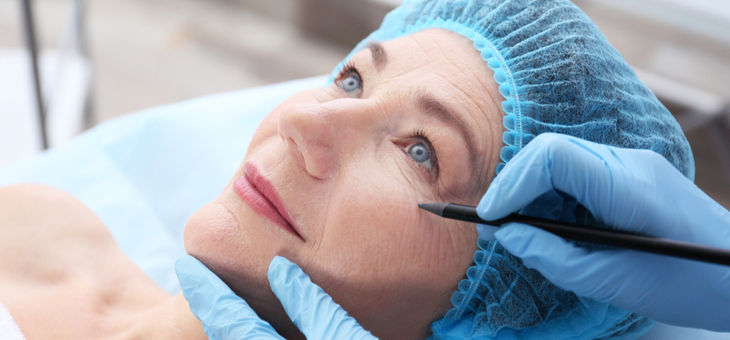Having changed most aspects of daily life, the pandemic has now created an unexpected new malaise, ‘Zoom dysmorphia’, a disorder involving obsessive focus on perceived flaws in appearance.
An article just published in the Journal of Plastic Surgery and Aesthetic Medicine says patients working from home are seeking plastic surgery in record numbers.
“A life disproportionately spent on Zoom may trigger a self-critical comparative response that leads people to rush to their physicians for treatments they may not have considered before months confronting a video screen, a new phenomenon of ‘Zoom dysmorphia’,” report Arianne Shadi Kourosh, MD, Massachusetts General Hospital, and co-authors.
“The COVID-19 pandemic has radically changed the frequency with which we are confronted with our own image. The shift to online work, learning, and even socializing has dramatically increased the time we have to observe ourselves,” says Benjamin Marcus, MD, University of Wisconsin Hospitals and Clinics, in an accompanying commentary.
Facial Plastic Surgery & Aesthetic Medicine editor-in-chief Travis T. Tollefson, MD, MPH, University of California, Davis, states: “It has always been incumbent on surgeons to understand the motivations that are driving individuals to seek plastic surgery in order to assure realistic goals that allow for successful surgeries. Now, more than ever, unique circumstances can be driving patient expectations that we should be taking into consideration.”
Experts already knew that higher levels of engagement on social media correlate with increased body dissatisfaction. But Zoom sessions exacerbate the problem.
“Unlike the still and filtered selfies of social media, Zoom displays an unedited version of oneself in motion, a self-depiction very few people are used to seeing on a daily basis,” explained Emmy Graber from the Dermatology Institute of Boston, US.
“This may have drastic effects on body dissatisfaction and desire to seek cosmetic procedures,” Ms Graber said.
During real-life conversations, people do not see their faces, and do not compare their faces to others like they do on video calls. Additionally, cameras and computer screens can create an inaccurate representation of true appearance, they said.
“One study found that a portrait taken from 12 inches away increases perceived nose size by 30 per cent when compared with that taken at five feet,” said Shauna M. Rice from Massachusetts General Hospital.
“Webcams, inevitably recording at shorter focal lengths, tend to produce an overall more rounded face, wider set eyes, and broader nose,” Ms Rice added.
The researchers noted that it was important to recognise the distorting effects of computer cameras and realise they are an inexact representation.
Fashion icon Vogue, unsurprisingly, is all over the issue. In August it reported: “While unattainable beauty ideals are nothing new, selfies, filters, and photo-editing apps are having an added, dramatic impact on our self-image.”
It turned to Hilary Weingarden, PhD, a body dysmorphia expert at Massachusetts General Hospital, to explain how we’re exposed to ‘perfected’ and completely unrealistic images every day because of technology.
“Comparing your appearance to perfected images that your peers have posted is a lofty and unattainable comparison, and it’s likely to set people up to feel self-critical or inadequate,” Dr Weingarden said.
“We’re hearing that (patients are) becoming fixated on worrying about their own appearance during the call, getting stuck fixing their appearance for the call by changing their make-up, lighting, or camera angle, and getting distracted during the call by comparing their appearance to others,” says Dr Weingarden.
It’s important to acknowledge the impulse to obsess, and disrupt negative thinking patterns.
“Over-focusing on your appearance for prolonged periods of time can actually distort your perceptions so that you’re no longer really seeing yourself clearly,” explains Dr. Weingarden.
“This is especially true when you look at your appearance up close and fixate on an area of concern for a prolonged period of time, rather than looking more holistically at your full reflection. That body part of concern can start to appear very blown out of proportion to you.”
Vogue’s tips to avoid Zoom dysmorphia:
- Consider what you care about beneath the surface.
Don’t base your self-worth on looks alone. Remind yourself of the other characteristics that you truly value about yourself and write them down.
- Practice reshifting your focus.
When you notice yourself becoming distracted on video calls because you’re worrying about your appearance, or comparing it to others, practice gently redirecting your focus back onto the content of the call.
- Spend less time looking at yourself.
Cut down time that is body-image focused, including looking in the mirror, taking selfies, and seeking reassurance from others about your appearance.
- Scroll with scepticism.
Ask yourself if photos you are looking at truly reflect what that person looked like in the moment, or if it was hand-selected, edited, and doctored up before being posted.
- Seek extra support if needed.
If you’re feeling particularly distressed by your appearance, seek support from a psychologist or therapist who specialises in body image to help guide you through the process of recalibrating and transforming your thoughts.
Has Zoom made you more self-conscious?
If you enjoy our content, don’t keep it to yourself. Share our free eNews with your friends and encourage them to sign up.
Related articles:
https://www.yourlifechoices.com.au/health/your-health/is-plastic-surgery-the-answer-to-good-health
https://www.yourlifechoices.com.au/health/your-health/men-now-turning-to-plastic-surgery
https://www.yourlifechoices.com.au/health/wellbeing/what-undereye-dark-circles-mean

